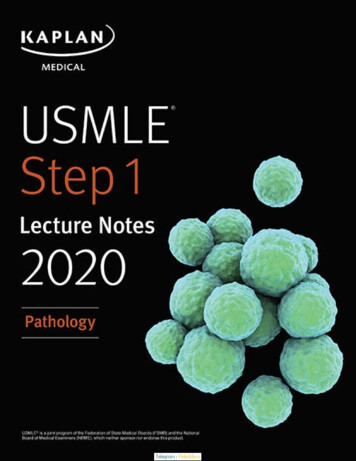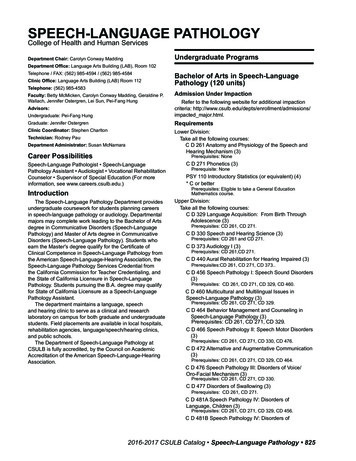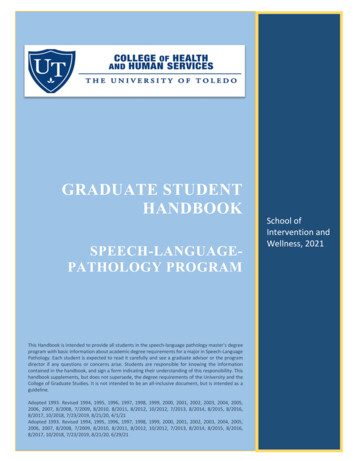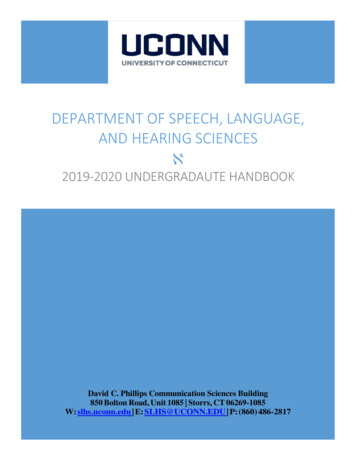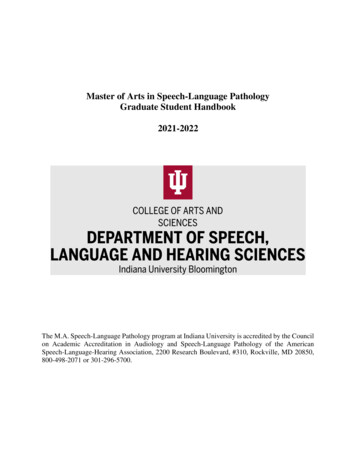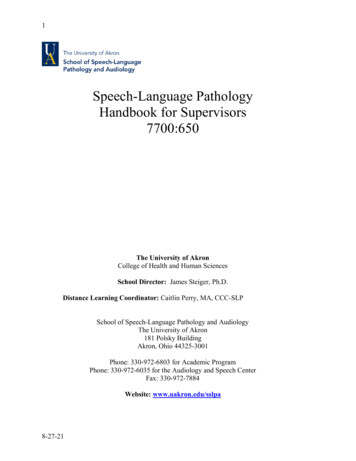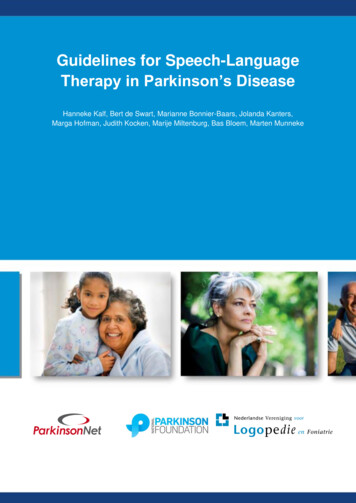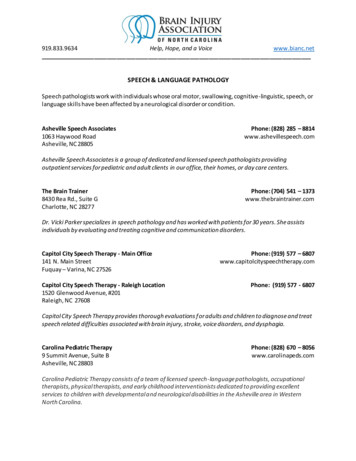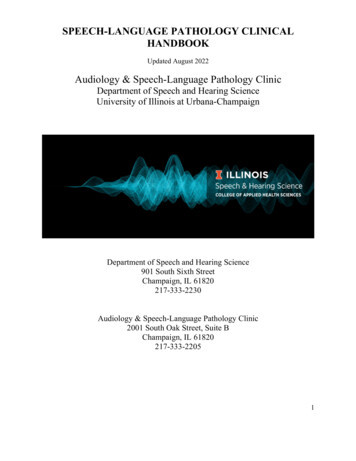
Transcription
SPEECH-LANGUAGE PATHOLOGY CLINICALHANDBOOKUpdated August 2022Audiology & Speech-Language Pathology ClinicDepartment of Speech and Hearing ScienceUniversity of Illinois at Urbana-ChampaignDepartment of Speech and Hearing Science901 South Sixth StreetChampaign, IL 61820217-333-2230Audiology & Speech-Language Pathology Clinic2001 South Oak Street, Suite BChampaign, IL 61820217-333-22051
AccreditationThe master’s M.A. education program in speech-language pathology at the University of Illinoisat Urbana-Champaign is accredited by the Council on Academic Accreditation in Audiology andSpeech-Language Pathology of the American Speech-Language-Hearing Association, 2200Research Boulevard, #310, Rockville, MD 20850, 800-498-2071 or 301-296-5700.Professional EthicsFaculty and clinical personnel in the Department of Speech and Hearing Science adhere to theASHA Code of Ethics and to the University of Illinois procedures. We welcome you to our clinicand invite you to learn and practice ASHA's Code of Ethics found at https://www.asha.org/Codeof-Ethics/ and the University of Illinois policy found at on in This HandbookThe information contained in this handbook is for guidance on matters of interest to faculty,staff, and students in the Department of Speech and Hearing Science at the University of Illinoisat Urbana-Champaign. The handbook sometimes summarizes campus and university policies as aconvenient reference tool. However, information on campus and university policies containedherein is for informational purposes only and is subject to change without notice. For the mostcurrent information, please see the official campus/university versions of these policies as postedon official web sites. These can be accessed through the Campus Policies and Procedures homepage at the following URL: https://www.uillinois.edu/about/policiesPlease note: The clinical programs in audiology and speech-language pathology adopted theCALIPSO program for tracking clinical experiences and records beginning January 2019 for theAu.D program class of 2022 and the MA-SLP program class of 2020. Additionally, theconversion to electronic medical records for the Audiology & Speech Language PathologyClinics was initiated May 2020. Some information in this handbook is subject to change uponconversion to the electronic medical records system.2
Table of ContentsPage5678SECTION IINTRODUCTIONA. Organizational Chart of AdministrationB. Department Mission & Vision StatementsC. Clinical PrioritiesSECTION IICLINIC FACILITIESA. Main OfficeB. Faculty/StaffC. Client/Patient Waiting AreaD. Clinic RoomsE. Clinic Chart/Work RoomF. Clinical Faculty OfficeG. Student WorkroomH. Therapy RoomsI. Clinic ComputersJ. KeysK. Patient ParkingL. Building Emergency Plan9101010101011111111111111SECTION IIICLINICAL PRACTICUMA. ASHA /Department RequirementsB. Criminal Background CheckC. SLP Clinic MeetingD. Submitting SchedulesE. SchedulingF. Clinic AssignmentsG. External RotationsH. Absence/Professional Behavior PolicyI. Clinical ParticipantsJ. Dress CodeK. Professional Behaviors121314151515151616171719SECTION IVCLINIC PROCEDURESA. Preparation for the EvaluationB. Location of the Appointment Schedule and ChartsC. Legal Release and Permission to Receive Evaluation/TherapyD. Health Insurance Portability and Accountability Act(HIPAA) Notice of Privacy Practices PolicyE. Patient Consent for Use and Disclosure of PHI/Receipt of Notice of Privacy Practices WrittenAcknowledgmentF. Consent for Disclosure of Confidential InformationG. Log to Track Disclosure of PHI21222222222323233
H.I.J.K.L.M.Fee Schedules and BillingThird-Party Payment ProceduresPatient Response Questionnaire EvaluationReportsPatient Appointment Changes/Cancellations/AbsencesCleaning and Care of Equipment and Facilities232324242424SECTION VSLP CHARTS AND DOCUMENTATIONA. Report WritingB. Lesson PlansC. SOAP NotesD. Order of the Forms in the Chart2526262627SECTION VISUPERVISIONA. Direct Supervision ProceduresB. GrievancesC. Clinical Instructor – Student ConferencesD. Professional Protocol and Evaluation ProceduresE. Evaluation of Clinical InstructorsF. Log of Clinical HoursG. Intervention PlansH. Student Learning Outcomes AssessmentI. AccommodationsJ. Policies and Procedures for Equitable TreatmentK. Student ComplaintsL. Campus Student Support Services29303031313131323333343535SECTION VIIPROFESSIONAL ORGANIZATIONSA. The American Speech-Language-Hearing Association(ASHA)B. The National Student Speech-Language-HearingAssociation (NSSLHA)36SECTION VIIISECTION IX3737HEALTH INSURANCE PORTABILITY AND ACCOUNTABILITYACT (HIPAA)38A. Training39B. Records39C. Clinical Protocol39INFECTION CONTROLA. TrainingB. Records424343*NOTE: All forms referenced in the Handbook are available in the MA-SLP ProgramInformational Forms folder on Box.4
Section IIntroduction5
AUDIOLOGY & SPEECH-LANGUAGE PATHOLOGY CLINICThe Audiology & Speech-Language Pathology Clinic is part of the Department ofSpeech and Hearing Science in the College of Applied Health Sciences at the Universityof Illinois at Urbana-Champaign. The purpose of the clinic is to train students todiagnose and treat communication disorders. Within the clinic, students in the Master ofArts in Speech-Language Pathology Program work with patients and their familiesunder the direct supervision of an individual who holds a State of Illinois license topractice Speech-Language Pathology and an American Speech-Language-HearingAssociation (ASHA) Certificate of Clinical Competence in Speech-Language Pathology(CCC-SLP). The Department of Speech and Hearing Science organizational chart isshown below.A. Organizational Chart of Administration6
Department of Speech and Hearing Science: Mission & Vision StatementsMission Statement: Enhancing communication across the lifespan by integratingresearch and clinical practice from the biological, behavioral, and social sciences.Vision Statement: Serve as a global leader for interdisciplinary research, education,clinical practice, and public engagement in human communication and its disabilitiesacross the lifespan.The research, teaching, and service programs of the Department of Speech and Hearing Scienceare committed to furthering understanding of the entire spectrum of communication. Theundergraduate curriculum offers a broad background in the theoretical, basic, and applied aspectsof biological, behavioral, linguistic, and social foundations of human communication to educatestudents who intend to pursue careers and/or graduate studies in many fields related tocommunication, health, and medicine. The graduate program focuses on research and clinicaleducation in communication, its disabilities, and the treatment and prevention of communicativedisorders. To these ends, the department: Educates the students of the state, nation, and world regarding the nature ofcommunication and communication differences and disabilities;Investigates health, development and aging, and disability related to speech, language,deglutition, and hearing across the life span;Develops methods to prevent, identify, assess, and treat disabilities of humancommunication;Prepares students to investigate communication and its disabilities as scientists andeducators; andPrepares students to prevent and treat communicative disabilities as speech-languagepathologists and audiologists.7
B. Clinical PrioritiesStudents in the Department of Speech and Hearing Science MA-SLP Program are expected tocomplete academic and clinical coursework during their enrollment at the University of Illinoisat Urbana-Champaign so that they will be fully prepared for licensure and certification. Due to ofthe number of clinical hours needed for certification, and the diversity of our scope of practice,students will need to exercise flexibility in their scheduling. Academic classes take priorityduring the week. Clinic is scheduled to avoid conflict with classes. Clinic scheduling has secondpriority. In order for the patients to be scheduled to meet the students' needs, work schedulesmust be considered last, including T.A. /R.A. assignments. It is often difficult to coordinate workwith clinic. Clinic scheduling is completed prior to the beginning of each semester.C. Clinical Practicum PrivilegesFaculty supervising students in the Audiology & Speech-Language Pathology Clinic are ethicallybound to protect the welfare of the patients in the clinic. This is paramount when any decisionsare made that may affect patients. This includes decisions about student participation in clinicalactivities. Therefore, student participation in clinical practicum is a privilege rather than a right.All graduate students are required to review the document entitled Supporting Student Successin SHS Professional Programs. The purpose of this document is to describe department andcampus-wide resources to support student success and outline the essential functions routinelyperformed by Audiologists and Speech-Language Pathologists (SLPs). All students entering theMaster of Arts in Speech-Language Pathology Program are encouraged strongly to read thisdocument and consider their potential for participating in these essential professional functions.Students who anticipate difficulty learning in either classroom or clinical settings are encouragedto contact the Director of Graduate Studies in SHS as soon as possible, as well as seek out othercampus resources, such as Disability Resources & Educational Services (DRES), as appropriate.Clinical faculty will meet at least twice each semester to review the clinical performance of everystudent enrolled in the MA program. If a student's overall grade point average drops below 3.0 orif the student exhibits any behavioral or performance characteristics that are determined byconsensus of the faculty to be inconsistent with the standards represented on the SLP AssessmentPracticum Form for Clinical Competences /Formative Assessment (see Section VI), the studentwill be counseled by the appropriate faculty. This counseling will inform the student that he/shemay require an intervention plan to ensure success in meeting the standards required of theprogram. Refer to the Supervision Section of this Handbook (see Section VI) for further detailsabout Intervention Plans. In some circumstances, the student's participation in clinical practicummay be terminated immediately for just cause.8
Section IIClinical Facilities9
A. Main Clinic OfficeThe main office is located at 2001 S. Oak St, Suite B, Champaign, IL 61801. The Office SupportAssistant, who handles patient telephone calls and clinic fees, is housed in the main office. If astudent receives a phone message from a patient or manufacturer, the student will be sent anemail or provided a message in their mailbox. The Audiology & Speech-Language PathologyClinic is open Monday through Friday. The Office Support Assistant is available from 8:00A.M. to 4:30 P.M.B. Faculty/StaffThe Department Head, Administrative Aide, Business Support Specialist and Graduate Secretaryare housed in the Administrative Suite on the first floor of the Speech and Hearing Buildinglocated at 901 South Sixth Street, Champaign, IL 61820. All tenure-track faculty, including theDirector of Graduate Studies have offices in the Speech and Hearing Building. The Audiology &Speech-Language Pathology Clinic is located at 2001 South Oak, Suite B, Champaign, IL 61820.Clinical faculty offices are in the Motorcycle Safety Program Building located at 4 Gerty Drive,Champaign, IL 61820.C. Client/Patient Waiting AreaThe waiting area for audiology and speech-language pathology services is located in the lobby ofthe Clinic. Students should meet their patients in the waiting room prior to eachsession/appointment. Conferences should not take place in the waiting area. If importantinformation needs to be exchanged with patients or parents, it should be discussed in the privacyof the clinic rooms per privacy policy. When greeting a patient, per privacy rules, you may greetthem by their first name or title and last name, but not both.Temperature checks for clients and caregivers will be done on daily arrival.D. Clinic RoomsStudents are responsible for keeping all clinical rooms and the patient waiting areas presentable,maintaining infection controls, and returning materials when finished using them. All clinicrooms will be maintained at the end of each session using infection control cleaning protocolimplementation.E. Clinic Chart/Work RoomThe student workroom in the clinic has two computers that students, clinical staff or clinicalfaculty may use to complete their clinical work. Masks should be worn at all times and theinfection control cleaning protocols implemented when tasks are completed in this space.10
F. Clinical Faculty OfficeClinical faculty utilize Room 1020 for office activities while at the clinic. Please knock beforeentering.G. Student WorkroomThe student workroom has all clinical faculty and MA student mailboxes, printers, a computer,and office supplies. Two portable audiometers are located in the student workroom.H. Therapy RoomsRoom 1017 houses the Computerized Speech Lab (CSL). Rooms 1005, 1013 and 1016 haveadditional therapy equipment (e.g. toys). Children’s books are located in room 1013.I. Clinic ComputersThe computers for word processing are located in Rooms 1018 and 1019. See Section VIIHIPAA for policies and procedures for properly maintaining confidentiality for all clinic patientinformation.J. KeysStudents will use their iCard to enter the Clinic and the ColLab during non-business hours.K. Patient ParkingPatient parking is located in front of the Clinic. Students may not park in the clinic parkingarea during the hours of 6 AM-6:15 PM M-F. Student parking is available directly across thestreet from the Clinic.L. Building Emergency PlanAll clinical students must familiarize themselves with the Building Emergency Plan. In case of aweather event, the NOAA weather radio will signal loudly. Please ask clinical faculty or staff toaddress the notifications on the radio and await further instruction. If a student is at the clinicafter hours, and the weather radio signals, press snooze once and listen to the instructions. In thecase of a tornado warning, all individuals should relocate to Room 1005. If you believe that youmight require assistance during a building evacuation, please let the Clinic Director know assoon as possible so that this accommodation may be included in the building emergency plan.11
Section IIIClinical Practicum12
The Master of Arts in Speech-Language Pathology Program in the Department of Speech andHearing Science is accredited by the Council on Academic Accreditation (https://caa.asha.org/).The program’s curriculum is structured to allow students to meet the Council for ClinicalCertification in Audiology and Speech-Language Pathology (CFCC) SLP standards for bothacademic/knowledge and clinical/performance 20-SLP-Certification-Standards/.)The objective of the programis to provide students with the knowledge base as well as the quantity and quality of clinicalexperiences that will lead them to become competent professionals.A. ASHA and Departmental RequirementsThe CFCC requires applicants for certification to complete a program of study that includesacademic course work and diverse practicum experiences. Students in the MA program mustattain a minimum of 375 clock hours and 25 observation hours while a student in order to qualifyfor licensure and ASHA certification. Clinical experiences must be sufficient in depth andbreadth to achieve the knowledge and skill outcomes stipulated in Standard V of the 2020Standards and Implementation Procedures for the Certificate of Clinical Competence in SpeechLanguage Pathology. In addition, the curriculum should include appropriate researchopportunities, consistent with the specified mission and goals of the program, and institutionalexpectations for doctoral programs.The department requires students to obtain 25 observation hours in speech-language pathologybefore the end of their first semester in the program. In most cases, these observation hours willbe obtained prior to beginning the MA degree. However, exceptions can be made in a case-bycase basis. Please note that not completing observation hours in a timely manner may delaycompletion of the program.Clinical clock hours are defined as direct client contact time involving assessment and/orintervention. In addition, students may obtain up to 75 hours via alternative methods, such asclinical simulations. Clinical practicum is defined as direct patient contact, consultation, recordkeeping, and administrative duties relevant to audiology service delivery. Clinical practicumexperiences will occur throughout the program. Clinical practicum experiences will occurthroughout the program. The program must provide sufficient breadth and depth of opportunitiesfor students to obtain a variety of clinical practicum experiences in different work settings, withdifferent populations, and with appropriate resources and equipment in order to demonstrateskills across the scope of practice in speech-language pathology and that are sufficient to enterindependent professional practice.Students in the MA-SLP Program register for at least one clinical practicum course eachsemester. These include SHS 477 for fall 1 & spring 1, SHS 577 for summer 1 and fall 2, SHS576 and SHS 577 for spring 2, and SHS 577 for summer 2. Credit for all clinical practicumcourses is variable, ranging from 1 to 4 hours. Students are required to provide quality servicesand meet the department policy for minimum performance in the clinic. Minimum performancecorresponds to a letter grade of B- or above. Therefore, the clinical instructor will not sign forclinical hours for earned grades of C or lower in any clinical practicum course; these hours willnot count toward ASHA certification. In addition, participation in all practicum courses adheres13
to SHS Department and Graduate College policies. If minimal performance is not achieved,continuation in clinic will be according to an intervention plan as described in Section VI,Supervision.B. Criminal Background CheckThe MA-SLP Program requires practicum experiences in which students work directly withclients in the department clinic and community settings. Graduate students will be required tocomplete a criminal background check annually. The student will be responsible for any feesassociated with the background check.The SHS departmental policy on background checks is that any convictions will be reviewed forcompatibility with placement in clinical practicum. Certain convictions, such as those that are abar to employment with a school district or are cause for denial of a professional license, mayprohibit a student from participating in practicum. These convictions are fully set out in theIllinois School Code, 105 ILCS 5/10-21.9, as amended l-st-sect-105-5-10-21-9.html). Convictions that are grounds for denial of aprofessional license are set forth in Illinois Speech-Language Pathology and Audiology PracticeAct 225 ILCS asp?ActID 1325&ChapterID 24).Castle Branch Procedure Go to: https://portal.castlebranch.com/UH74 for Speech and Hearing Science Select Please Select Select Speech & Hearing Science Select from the following as it pertains to your placements:o UH74addition: Illinois CANTS Search and Nationwide Healthcare Fraud &Abuse Scan: covers and includes a check of sex offender registries as well as theOIG, SAM, SDN exclusions lists check (completed as needed per external placement)o UH74bg: Background check (initial background check with Castle Branch which isoo completed prior to start of the Graduate Program)UH74dt: Drug Test (completed annually)UH74re: Background Check (the yearly recheck; if the ped abuse scans are needed, youwould use this package & the UH74 addition)1-3 day turnaround time, not expected to be more than 5In addition to the background check, some external placement sites may have otherrequirements that must be completed before a student is allowed to be placed at the site. Theserequirements may include but are not limited to immunizations, drug testing or additionaltraining (e.g. HIPAA, CPR training/certification). The student will be responsible for feesassociated with any required testing or training by an external placement site. Informationabout site requirements is retained on CALIPSO and is updated annually.14
C. SLP Clinic MeetingMA students will meet weekly during the semester for Fall 1 and Spring 2. Additionally, studentsmay have small team meetings with their supervising clinical faculty. Student attendance at themeetings is mandatory.D. Submitting SchedulesPrior to the end of each semester, students are required to complete a schedule of availability forthe following semester indicating availability (and lack thereof) for participation in clinicalactivities. This Practicum Schedule should include information pertaining to the times coursesare being taken and work assignments. All forms must be up-to-date and all changes should begiven to the appropriate clinical faculty as soon as they occur.E. SchedulingThe clinical faculty and staff complete scheduling before the beginning of each semester. It is theresponsibility of the student, clinical instructors, and the External Rotation Coordinator to ensurethat each student receives a variety of clinical experiences. Due to the nature of clinical work,clients may be added or dismissed during the course of the semester. Students are asked to beflexible with changes to their clinical caseload, as this reflects the realities of clinical work.F. Clinic AssignmentsClinical assignments are provided to the students prior to the beginning of the semester, with theexception of the first semester of enrollment. If there are questions or conflicts, the student is tosee the appropriate clinical faculty or staff member or the External Rotation Coordinatorimmediately. Students are required to see their clients through the end of finals week eachsemester. In-house clinic follows the University Calendar. Students in external rotations,especially SHS 576 and SHS 577 in summer 2 will need to follow the calendar associated withtheir clinical rotation (e.g., in SHS 576, the student will follow the spring break of the schooldistrict, not of the University of Illinois). Students will be told the number of practicum credithours to register for prior to each semester of practicum. Students will keep track of their clinicpatient contact hours and scope of experiences using CALIPSO.15
G. External RotationsThe External Rotation Coordinator will assign external rotations and will consult with the ClinicDirector as needed. Some facilities may require an interview prior to approval for the rotation.Students may request a rotation facility, but the final decision will be made by the ExternalRotation Coordinator and external rotation personnel. If the student objects to an assignedrotation this should be discussed with the External Rotation Coordinator and the Clinic Director.However, if changes cannot be made, or it is felt that changes should not be made, the student’srotation site for that semester will remain as scheduled. See Section I, Clinical PracticumPrivileges for further information. Refusal of any clinical rotation may prolong the durationof your clinical program.It is important to submit paperwork/documentation for external rotations in a timely manner;failure to do so may jeopardize a student’s ability to attend that rotation and delay graduation.A list of possible external rotation facilities is found in Calipso. To maximize experiences andtake full advantage of the diverse training opportunities at external facilities, you may berequired to have access to reliable transportation for 45-60 miles.Students may not cancel any assigned time block/session in-house or day at an external rotationduring the semester without preapproval of the External Rotation Coordinator and the instructorat the external rotation. Students enrolled at an external rotation facility will be required tocomplete the External Placement Survey form on CALIPSO at the end of each semester.H. Absence/Professional Behavior PolicyAlthough the majority of graduate students achieve nearly perfect attendance, some do not.Therefore, it has been necessary to develop an absence policy so that clinic patients experienceconsistent, quality services. This system applies to absences due to emergencies, such as funeralsand other life events.Interviews that occur at any time during the MA program for external rotations or foremployment must be scheduled on days when the student is not committed to a clinicalassignment or the student will receive a Notice of Absence.Each time a student misses an assigned in-house clinic session or an external rotation day, thestudent will receive a Notice of Absence from the appropriate instructor. If a student receivesthree Notices of Absence and/or Professional Behavior Reminders for in-house or externalrotations in one semester, the clinic grade for either in-house clinic or for the external rotationmay be dropped by one letter grade. This may also trigger an intervention plan (see Section VI).Missing an external rotation assignment that occurs on one day would result in one Notice ofAbsence and/or Professional Behavior Reminder. If an external rotation is missed on twoassigned days, this will result in the student receiving two Notices of Absence and/orProfessional Behavior Notices.16
Receiving a Notice of Absence form does not necessarily mean that the student has demonstratedunprofessional behavior. It may be necessary for a student to miss an assigned time block ormeeting due to illness, a personal emergency, a job/rotation interview or a convention/workshop/conference. This is simply a way to keep track of the number of absences that haveoccurred. Absence must be handled in a professional manner as outlined below. If not, thesemester grade in the Professional Protocol section of the Clinical Competencies FormativeAssessment will be reduced.If an emergency/absence occurs and a student must miss an assigned clinic time block at anexternal rotation, he/she is required to contact the external rotation supervisor and thenimmediately contact the External Rotation Coordinator at the university. When possible, theExternal Rotation Coordinator should be contacted at least 12-to-24 hours prior to the clinic timeslot in question. Students are required to make up missed time blocks at rotation sites at thediscretion of the external clinical supervisor.Should a personal emergency arise, the Student Assistance Center in the Office of the Dean ofStudents serves as the first point of contact for students requesting assistance for personalemergencies—students may drop in or make an appointment. Assistant Deans help studentsunderstand university policies and procedures, guide them in connecting to other campusresources, and support students in crisis. The Student Assistance Center can assist students with abroad range of issues that may be affecting their academic and/or clinical performance, includingissues related to physical and mental health, course attendance, accessing various campus services,and options for withdrawing from the university.If the student is going to miss in-house clinic the student should contact their immediate clinicalinstructor. At that time, the student and clinical instructor will decide if coverage is needed forthe time block and if so, how the student will arrange for the coverage. When a student is absentfrom clinic, the student must arrange for another student to cover the scheduled time slot.Failure to follow the Absence Policy as described will result in the student receiving aProfessional Behavior Notice.I. Clinical ParticipantsUndergraduates may enroll in SHS 475 (Pre-practicum in SHS). Your clinical instructor willprovide you more information as required. This opportunity to mentor undergraduate studentscan provide you with initial experiences in supervisory behavior as required by the ASHA 2020standards.J. Dress Code:All students in the Audiology & Speech-Language Pathology Clinic are expected to dress in amanner consistent with the professional role they are assuming. Professional appearance can helppromote authority and respect as a healthcare professional in training. Clothing should be neatand well maintained with regular laundering/cleaning/ironing. The clinical faculty reserve theright to request that a student change her/his clothing and/or accessories if they the clinical17
faculty concerns that it will negatively affect patient care. Nametags must be worn in the Clinic.Please discuss with your clinical instructor about nametag protocol. When at an external site,students must adhere to the dress code of that particular site. This may require purchasingadditional clothing at the expense of the student (e.g. scrubs, lab coat). It is expected that studentscomply with dress code during telepractice activities. The guidelines for dress are as follows: Hair, earrings and facial jewelry: Consider how you will be interacting with yourpatient when styling your hair. For example, if you are working with a young child or anindividual with dementia, wearing the hair down might be tempting for the patient to pull.Additionally, if you are doing a procedure that requires gloves, will you be frequentlytucking your hair behind your ear? Earrings can be a distraction to young children. Facialjewelry may need to be covered at the discretion of the clinical instructor as it may be adistraction or a hazard. Tops & Blouses: Students often do not realize how mu
The master's M.A. education program in speech-language pathology at the University of Illinois at Urbana-Champaign is accredited by the Council on Academic Accreditation in Audiology and Speech-Language Pathology of the American Speech-Language-Hearing Association, 2200 Research Boulevard, #310, Rockville, MD 20850, 800-498-2071 or 301-296-5700.
